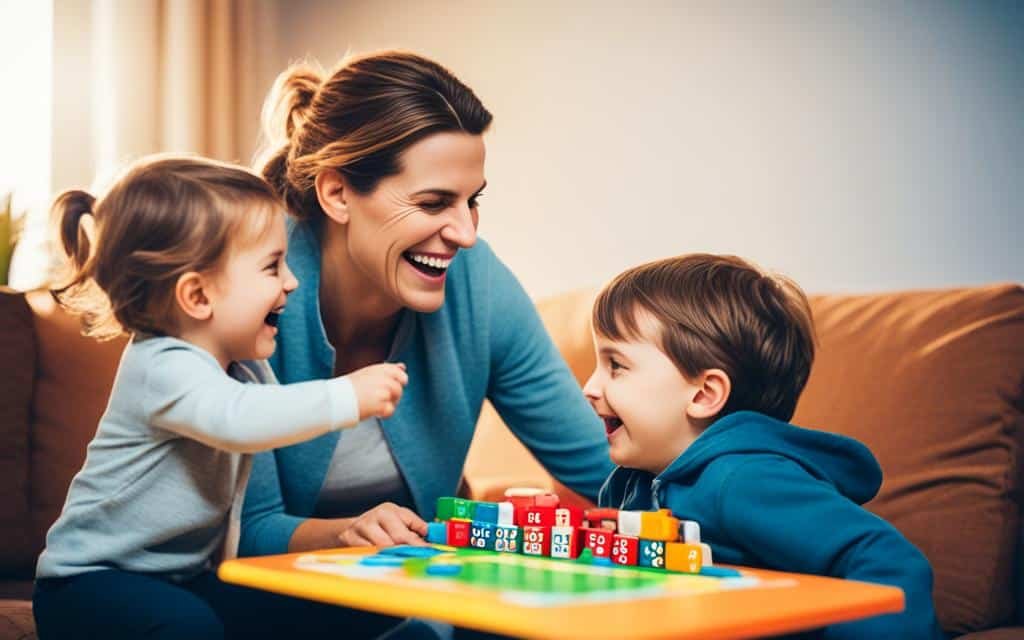Think back to your childhood for a moment. Can you recall the laughter shared with your siblings, the mischief you got into together, or the secret codes only the two of you understood? Sibling relationships are unlike any other. They are filled with a unique blend of love, sibling rivalry, and companionship that leave an indelible mark on our lives.
While we often highlight the importance of relationships with our parents and extended family, the bond we share with our brothers and sisters can sometimes go unnoticed. Yet, it plays a vital role in shaping our identity, values, and emotional well-being. Research has shown that sibling relationships contribute significantly to a child’s development, resilience, and overall happiness.
Whether you have a brother, sister, or both, these invaluable connections have the power to influence us throughout our lives. They understand us in ways that no one else can, they challenge us to grow, and they provide a lifelong source of support and understanding.
In this article, we will delve into the dynamics of sibling relationships, exploring their impact on child development, the unique roles brothers and sisters play in each other’s lives, and ways to navigate the complexities and challenges that may arise. Additionally, we will discuss how shared experiences and parental guidance can strengthen sibling ties and foster a lasting sense of familial connection.
Join us on this journey of discovery as we unravel the depths of sibling relationships and uncover strategies for encouraging positive bonds.
Key Takeaways:
- Sibling relationships have a profound influence on a person’s development and well-being.
- Siblings provide unique support, understanding, and companionship throughout their lives.
- Understanding and navigating the dynamics of sibling relationships is crucial for fostering positive bonds.
- Shared experiences and activities play a significant role in strengthening sibling ties.
- Parents play a vital role in creating a nurturing environment and promoting positive sibling dynamics.
Understanding the Impact of Sibling Dynamics
Sibling dynamics play a vital role in shaping a child’s development and overall well-being. The interactions between siblings can significantly impact their behavior, adjustment, and growth. In this section, we will explore the role of sibling interactions in child development, the direct and indirect influence that brothers and sisters exert on each other, and the complexities of navigating sibling bonds.
The Role of Sibling Interactions in Child Development
Siblings act as both role models and teachers for one another, offering valuable guidance and support as they navigate the world. Through their interactions, siblings learn essential life skills, develop social and emotional competencies, and acquire problem-solving abilities. These interactions foster the development of empathy, cooperation, and conflict resolution skills.
Research has shown that positive sibling interactions can contribute to increased prosocial behaviors and enhanced cognitive development in children. By engaging in cooperative play, sharing, and taking turns, siblings learn to collaborate and communicate effectively, promoting their overall development.
However, sibling interactions are not always harmonious. Conflicts can emerge due to competition for parental attention, sharing limited resources, or differences in personality and temperament. These conflicts, when managed effectively, can lead to important growth opportunities, teaching children negotiation, compromise, and the management of conflict resolution strategies.
The Direct and Indirect Influence of Brothers and Sisters
Siblings have both direct and indirect influences on each other. Direct influences occur through daily interactions, such as sharing experiences, playing together, and engaging in cooperative activities. Through these direct interactions, siblings learn from and support each other, fostering skills and qualities that contribute to their overall development.
Indirect influences, on the other hand, involve observing and imitating each other’s behaviors. Siblings act as powerful role models for one another, shaping their attitudes, values, and behaviors. They learn from their siblings’ experiences and can be influenced by their achievements, interests, and choices.
Moreover, siblings can also introduce each other to new ideas, perspectives, and social circles, expanding their horizons and promoting personal growth. However, it’s important to note that these influences can be positive or negative, depending on the nature of the interactions and the behaviors being observed.
Navigating Complex Sibling Bonds
Sibling relationships are often characterized by a complex blend of love, competition, and conflict. While siblings share a unique bond, their individual personalities, needs, and desires can sometimes create challenges in navigating these relationships effectively.
Understanding and addressing the complexities of sibling bonds involve acknowledging and managing conflicts, promoting open communication, and fostering empathy and mutual respect. Parents play a crucial role in guiding their children through these dynamics, teaching them appropriate conflict resolution strategies and providing support when needed.
By providing a supportive and nurturing environment, parents can help in building healthy sibling relationships that will endure throughout their lives. Celebrating each child’s unique qualities and fostering an atmosphere of love, understanding, and cooperation can contribute to the development of strong and lasting sibling bonds.

| Sibling Dynamics | Impact on Child Development |
|---|---|
| Positive interactions and support | Promotes social and emotional development, enhances cognitive skills, builds empathy and cooperation |
| Conflicts and competition | Provides growth opportunities for conflict resolution, negotiation, and compromise |
| Direct influence | Through daily interactions, siblings learn from and support each other |
| Indirect influence | Observing and imitating siblings’ behaviors, shaping attitudes, values, and behaviors |
| Complex blend of love, competition, and conflict | Navigating these dynamics involves acknowledging conflicts, promoting open communication, and fostering empathy and respect |
Strengthening Sibling Ties Through Shared Experiences
Shared experiences play a vital role in strengthening sibling ties. By spending time together and engaging in activities that they both enjoy, siblings can develop shared interests and build trust and respect. Activities such as family outings, game nights, or shared hobbies create opportunities for siblings to bond, make memories, and deepen their connection. These shared experiences contribute to the overall strength of the sibling relationship.
Engaging in bonding activities allows siblings to create lasting memories and solidify their bond. Whether it’s going on a camping trip, playing sports, or even cooking and baking together, these shared experiences foster a sense of togetherness and reinforce the sibling connection.
Participating in shared activities also helps siblings develop shared interests. This common ground provides a platform for meaningful conversations, shared laughter, and the opportunity to understand each other on a deeper level. It fosters a sense of camaraderie and builds a foundation of mutual understanding and support.
Moreover, bonding activities offer siblings the chance to collaborate and work together towards a common goal. This cooperation strengthens their teamwork skills and teaches them valuable lessons about compromise, communication, and problem-solving. These skills are essential not only in their relationship but also in other aspects of their lives.
By actively participating in shared experiences and bonding activities, siblings strengthen their connection, create a treasure trove of memories, and build a solid foundation of love and support. These shared moments become the glue that holds their relationship together, helping them navigate life’s challenges as a united front.
Parental Role in Fostering Healthy Sibling Relationships
Parents play a crucial role in shaping the dynamics of sibling relationships. By creating a harmonious environment with open communication, they can foster healthy sibling bonds that contribute to the overall well-being of the family.
Creating a Harmonious Environment with Open Communication
Open communication is essential in promoting healthy sibling relationships. Parents can model respectful and effective communication, encouraging their children to express themselves honestly and without fear of judgment. By actively listening to their children’s concerns, parents create a safe space for open dialogue, allowing siblings to understand and support each other better.
“When parents prioritize open communication, siblings feel heard, understood, and valued. This encourages them to share their thoughts, resolve conflicts, and build trust.”
Parents should set aside dedicated time for family discussions to address any issues that may arise. This reinforces the importance of open communication and allows for the resolution of conflicts in a constructive manner. By actively involving siblings in decision-making processes and encouraging them to express their opinions, parents promote a sense of inclusion and empowerment within the family.
Mitigating Favoritism and Its Impact on Sibling Bonds
Favoritism can have a detrimental effect on sibling relationships, leading to feelings of resentment and rivalry. It is essential for parents to treat each child equally, ensuring fairness and fostering positive sibling dynamics.
By being aware of their own biases and consciously avoiding favoritism, parents can create an environment where siblings feel valued and appreciated for their individual strengths and qualities. Parents can allocate time and attention fairly among their children, considering their unique interests and needs. This prevents the development of a sense of competition and fosters a more supportive and loving sibling bond.
Recognizing and celebrating each child’s achievements and milestones equally is another way to mitigate favoritism. By acknowledging and expressing genuine pride and joy for each sibling, parents cultivate a sense of unity and reinforce the importance of cherishing one another’s accomplishments.

By actively playing a positive role in fostering healthy sibling relationships, parents lay the foundation for a lifelong bond built on love, respect, and open communication. Through their guidance and support, parents empower siblings to navigate the complexities of their relationship, creating a thriving family environment that nurtures and strengthens the sibling bond.
Encouraging Positive Bonds in Sibling Relationships
Encouraging positive bonds in sibling relationships is essential for a strong and supportive family unit. When siblings have a loving and supportive bond, they can create a lifelong connection built on trust, compassion, and shared experiences. As parents, you play a crucial role in fostering love and support among your children.
To promote positive sibling relationships, consider the following strategies:
- Encourage celebration: Foster an environment where siblings celebrate each other’s successes and accomplishments. Encouraging them to cheer for one another reinforces positive affirmations and boosts their bond.
- Promote cooperation: Encourage siblings to work together on common goals or projects. Whether it’s completing a household chore or planning a family event, promoting cooperation allows siblings to learn teamwork and build a sense of unity.
- Facilitate turn-taking: Teach your children the importance of taking turns. This includes taking turns choosing activities, deciding on family outings, or even playing games. By promoting fairness and ensuring everyone gets a chance to be in control, you help establish a harmonious sibling dynamic.
- Value individuality: Emphasize the uniqueness of each sibling and encourage them to appreciate and respect each other’s differences. Celebrate their individual strengths and talents, fostering a sense of mutual respect and understanding.

Conclusion
In conclusion, sibling relationships have a lasting impact on individuals’ lives. Embracing the unique dynamics of each sibling relationship allows for understanding and appreciation of the individual connections.
Building a lasting legacy of familial support and understanding involves creating a nurturing environment, promoting positive communication, and fostering love and respect among siblings. By prioritizing and investing in sibling relationships, families can build strong bonds that last a lifetime.
FAQ
How do sibling relationships impact a person’s life?
Sibling relationships have a significant impact on a person’s life, influencing their development, well-being, and social interactions.
What role do siblings play in a child’s development?
Siblings act as role models and teachers, shaping a child’s behavior, adjustment, and life skills.
What are some common dynamics in sibling relationships?
Sibling relationships can involve both conflict and love, with siblings often competing for attention and influencing each other’s behaviors.
How can shared experiences strengthen sibling ties?
By engaging in activities together and creating shared memories, siblings develop shared interests and build trust and respect.
How can parents foster healthy sibling relationships?
Parental role in sibling bonds is huge. Parents can create a harmonious environment by promoting open communication and avoiding favoritism among their children.
How can positive bonds be encouraged in sibling relationships?
Positive bonds can be fostered by promoting love, support, and cooperation among siblings and appreciating each other’s differences.
What is the importance of embracing the unique dynamics of each sibling relationship?
Embracing the unique dynamics allows for understanding and appreciation of individual connections, creating a lasting legacy of familial support and understanding.










